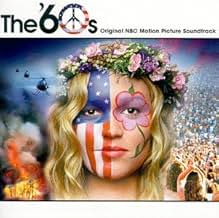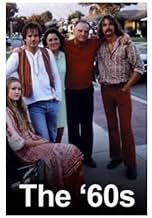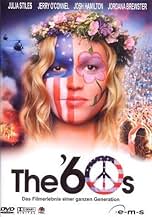IMDb RATING
6.9/10
2.7K
YOUR RATING
The events of the 1960s affect the lives of two families, one white and one black.The events of the 1960s affect the lives of two families, one white and one black.The events of the 1960s affect the lives of two families, one white and one black.
- Nominated for 3 Primetime Emmys
- 2 wins & 10 nominations total
Browse episodes
Featured reviews
I enjoyed the plot, The cast did a great job. If you ever seen Woodstock. This is in your ball park. The soundtrack is just as good as the movie. Julia Stiles proves that she is a great actress, Jerry O'Connell once again has proven his talent as an actor. This is one not to miss. If you did you wish you hadn't.
Oh well - this series is crap, i mean, absolutely. They should have been awarded for worst script, worst acting, worst interpretation of history, worst use of stereotypes, worst use of a fake mustache in an attempt to duplicate the Tom Cruise of the 4th July - but, miracle!, making him walk - worst cinematography, worst art directing, worst costumes, worst editing, worst leftism (i mean, this is how you lived your '68? You shoulda stayed home! C'mon dude, where's the politics), worst use of Bob Dylan clips (clips from the seventies in a sixties movie?). If you wanna be a die-hard nostalgic hippie substantially not caring about most of the political facets of it, if you can't read a book or you'd fall asleep, if you hate documentaries, if Woodstock to you is a little yellow bird, if you want to see some 80s haircuts misplaced in time, well this might be for you. I mean, Hair was a musical, a fantastic movie, it was not intended to be a portrait of a generation - but hell, it was 1000 times more realistic than this. Hey, if all the people in the USA during the sixties were dumb as the characters of this crap i think at least somebody had a good reason to fly to Vietnam: not hearing anything anymore from dummies country! I guess the sixties were definitely better than this, but, i mean, what was the worst year in the whole history? The less interesting year of all time? I don't know, but put that year in the hands of a medium-level director and he'll do something more enjoyable. Shame on whoever worked on this - none of you did a good job!
What the movie The 60s really represents (to those of us who growled around in the belly of America in those times) is the turbulence and diversity of the decade. Despite the exaggerated, stereotyped characters, the genuineness of the issues remains clear.
Not only were those radical times of change, but also very confusing times. Two basic things changed our world then: the 1964 Civil Rights Act, and the overwhelming influence of the media. Those two new freedoms began social changes that soon became institutionalized.
From chaos came sensitivity, from disorder came values. Bear in mind however, that the bulk of Americans were not involved in this... they worked, they played, they watched the news... and slowly they became effected by the efforts and struggles of the minorities... the Civil Rights workers, the Political Activists, the Anti-War efforts, the War on Poverty....
The representation of the power of the press and TV in particular, was well reflected, although the conflict between the general public's attitude and those seeking to change things was at best ignored... and at worst, misrepresented.. Middle class Americans weren't all standing around angrily holding baseball bats, or disowning their wayward daughters. They were confused too. Let us not forget how Folk Singers suddenly became Protest Singers, and how The Beatles began an onslaught that killed the Folk-Protest Movement. There are no Beatle songs in the movie, or even any mention of them.
I think if you didn't live the decade, you might not have a sense of what the movie is about, the overall picture is a bit dim. At one point I held down a steady job while my sister lived at the Hog Farm Commune and went to Woodstock. At another point I was in Haight Asbury and in the Detroit Riots while she worked and played the housewife in Maine and Connecticut. Roles were constantly changing.
The movie depicts three siblings of a middle class family. They represent the hippie child, the political activist, and the active military personnel. Dad represents the typical attitudes, and mom represents the voice of reason, tolerance, and sometimes compromise... for the sake of peace.
The Black family comprises a minister and his son... disproportionately, I think. I assume the producers knew all the variables and had to settle on limitations, or else the film would have become a long, boring, documentary. Dad's message was that anger produces bitterness, and bitterness produces chaos. It was clearly a message directed to today's youth.
We are looking at a unique solution to social problems, and also how issues divide us... The 60s were unusual in that way, and only the Roaring 20s compare. In other words, this movie has a moral after all. In the end, it is our Collective Individualism that survives. Put that in your oxymoron list.
Everyone was a God, a Guru, or a free-spirited genius in the 60s. It was a time of magic and madness. No one will ever nail the 60s down right... it was too diverse (this movie is close). At least we can say we are not ashamed of it, that we learned and grew from it, and that for once, a generation shaped and changed America... for the better.
Not only were those radical times of change, but also very confusing times. Two basic things changed our world then: the 1964 Civil Rights Act, and the overwhelming influence of the media. Those two new freedoms began social changes that soon became institutionalized.
From chaos came sensitivity, from disorder came values. Bear in mind however, that the bulk of Americans were not involved in this... they worked, they played, they watched the news... and slowly they became effected by the efforts and struggles of the minorities... the Civil Rights workers, the Political Activists, the Anti-War efforts, the War on Poverty....
The representation of the power of the press and TV in particular, was well reflected, although the conflict between the general public's attitude and those seeking to change things was at best ignored... and at worst, misrepresented.. Middle class Americans weren't all standing around angrily holding baseball bats, or disowning their wayward daughters. They were confused too. Let us not forget how Folk Singers suddenly became Protest Singers, and how The Beatles began an onslaught that killed the Folk-Protest Movement. There are no Beatle songs in the movie, or even any mention of them.
I think if you didn't live the decade, you might not have a sense of what the movie is about, the overall picture is a bit dim. At one point I held down a steady job while my sister lived at the Hog Farm Commune and went to Woodstock. At another point I was in Haight Asbury and in the Detroit Riots while she worked and played the housewife in Maine and Connecticut. Roles were constantly changing.
The movie depicts three siblings of a middle class family. They represent the hippie child, the political activist, and the active military personnel. Dad represents the typical attitudes, and mom represents the voice of reason, tolerance, and sometimes compromise... for the sake of peace.
The Black family comprises a minister and his son... disproportionately, I think. I assume the producers knew all the variables and had to settle on limitations, or else the film would have become a long, boring, documentary. Dad's message was that anger produces bitterness, and bitterness produces chaos. It was clearly a message directed to today's youth.
We are looking at a unique solution to social problems, and also how issues divide us... The 60s were unusual in that way, and only the Roaring 20s compare. In other words, this movie has a moral after all. In the end, it is our Collective Individualism that survives. Put that in your oxymoron list.
Everyone was a God, a Guru, or a free-spirited genius in the 60s. It was a time of magic and madness. No one will ever nail the 60s down right... it was too diverse (this movie is close). At least we can say we are not ashamed of it, that we learned and grew from it, and that for once, a generation shaped and changed America... for the better.
oh ya, I was there and can vouch for the veracity of many of the scenes in this series. My background was that of a naive shy geeky type and it took me a long time to come to terms with what happened during the 60s. A time of very rapid and huge social change. The course of the decade is mirrored in the story presented in this excellent representation. The remnants of the bobbysoxer era gave way to some pretty horrid psychedelic tunes but then Jimi Hendrix hit the air waves. His legacy will in 200 years be similar to Amadeus Mozart: they both revolutionized music, lived on the edge, died young and broke. The difference is we have Jimi's live recordings and know his resting place. The characters then undergo some defining moments, and the war in southeast Asia spills over. The end of the film was rather abrupt and bewildering, same goes for that decade. I was there when the hippie era ended in a similar fashion.
Plausibility of this story ranges from dead on to highly unlikely. But you have to remember the hippie era was partly based on a lot of media hype and voyeurism. This range of views is correctly portrayed.
Julia Stiles was uniquely outstanding in her role as the wayward daughter who struggles against the downside of a society that in some cases was determined to devour its young. I too was kicked out of the house at a young age but I deserved it having chosen to sport long hair and argue with my parents at every opportunity. Fortunately I had a job at the time and all was forgiven eventually. Gee, thats exactly what happens in this movie. Its no wonder Ms Stiles has gone on to many more film projects and I hope to see her in roles that extend her talent.
Out of all the portrayals I have seen of that period, 'The 60s' is the most accurate. I was there, I should know. I even lived in a hippie house the summer of 1970. It was a farm house converted to a non-denominational church and some teens from around Canada and one chap from Jamaica were there on an exchange program. Music, motorcycles, pot, hitch-hikers, stern faced members of the establishment, oh ya, I had some flashbacks watching this one.
You can look back but you can never go back.
Plausibility of this story ranges from dead on to highly unlikely. But you have to remember the hippie era was partly based on a lot of media hype and voyeurism. This range of views is correctly portrayed.
Julia Stiles was uniquely outstanding in her role as the wayward daughter who struggles against the downside of a society that in some cases was determined to devour its young. I too was kicked out of the house at a young age but I deserved it having chosen to sport long hair and argue with my parents at every opportunity. Fortunately I had a job at the time and all was forgiven eventually. Gee, thats exactly what happens in this movie. Its no wonder Ms Stiles has gone on to many more film projects and I hope to see her in roles that extend her talent.
Out of all the portrayals I have seen of that period, 'The 60s' is the most accurate. I was there, I should know. I even lived in a hippie house the summer of 1970. It was a farm house converted to a non-denominational church and some teens from around Canada and one chap from Jamaica were there on an exchange program. Music, motorcycles, pot, hitch-hikers, stern faced members of the establishment, oh ya, I had some flashbacks watching this one.
You can look back but you can never go back.
The 60's is a great movie(I saw it completely in one night) about the hippy movement in the late 60's. Although the title would suggest otherwise the first 5 years of the 60's are not really important in this film.
The main character of the movie is Michael,a political activist who goes on the road in the US against the Vietnam-war. There he meets his girlfriend,Sarah.Michael's brother,Brian,goes to Vietnam to fight(what a surprise!).He comes back from the war and changes in a "Tom Cruise Born on the fourth of July" look a like and then into a Hippy.His dad is a pro-vietnam war type of guy(what a surprise!!).Michael's sister Kate gets pregnant from a Rock & Roll artist and runs away from home and goes to San Francisco during the summer of love. The ending is very poor(father becomes a liberal and everybody is happy),but I let this slip away from my vote(the rest of the movie is very good!).
The performances by the actors are pretty good and the soundtrack of the movie is absolutely brilliant. All the main events of the sixties are in the movie,like the murders on JFK and Martin Luther King aswell as the big hippy protests,the summer of love and Woodstock! Look closely for Wavy"Woodstock Speaker"Gravy(What we have in mind is breakfast in bed for 400.000!) as a first aid employee at the Woodstock festival!
In the end,the 60's is a beautiful movie about a beautiful decade! 10/10
The main character of the movie is Michael,a political activist who goes on the road in the US against the Vietnam-war. There he meets his girlfriend,Sarah.Michael's brother,Brian,goes to Vietnam to fight(what a surprise!).He comes back from the war and changes in a "Tom Cruise Born on the fourth of July" look a like and then into a Hippy.His dad is a pro-vietnam war type of guy(what a surprise!!).Michael's sister Kate gets pregnant from a Rock & Roll artist and runs away from home and goes to San Francisco during the summer of love. The ending is very poor(father becomes a liberal and everybody is happy),but I let this slip away from my vote(the rest of the movie is very good!).
The performances by the actors are pretty good and the soundtrack of the movie is absolutely brilliant. All the main events of the sixties are in the movie,like the murders on JFK and Martin Luther King aswell as the big hippy protests,the summer of love and Woodstock! Look closely for Wavy"Woodstock Speaker"Gravy(What we have in mind is breakfast in bed for 400.000!) as a first aid employee at the Woodstock festival!
In the end,the 60's is a beautiful movie about a beautiful decade! 10/10
Storyline
Did you know
- TriviaActors Donovan Leitch Jr. and Carnie Wilson are the respective children of musicians Donovan and The Beach Boys' singer and composer Brian Wilson, both of whom are heard in the soundtrack. Jason Nesmith, son of ex-Monkee Michael Nesmith, also appears.
- GoofsAt the end during the BBQ, the mother asked "How's my boy today?" there is a boom mic visible.
- Quotes
Bill Herlihy: Are you still my baby?
Katie Herlihy: No, dad, I grew up. But I am still your daughter.
- Alternate versionsA scene where Katie and her friends gathered in front of her television to watch The Beatles performance on the Ed Sullivan show was originally shown in NBC's first broadcast of the mini-series but ended up getting cut out of all the home video versions of the film (including NBC's own 2 tape set which could only be ordered straight from the network). The scene is also missing from later presentations of the film on networks such as VH1. In the scene Katie and her friends sit on the floor in front of the television and scream in delight at the sight of The Beatles while Katie's brother, Michael, sits behind them secretly trying to brush his hair down so that he can look like the famous quartet.
- ConnectionsFeatured in The 51st Annual Primetime Emmy Awards (1999)
- How many seasons does The '60s have?Powered by Alexa
Details
- Release date
- Country of origin
- Language
- Also known as
- Los '60s
- Filming locations
- Redlands, California, USA(Columbia campus scenes)
- Production companies
- See more company credits at IMDbPro
Contribute to this page
Suggest an edit or add missing content



































